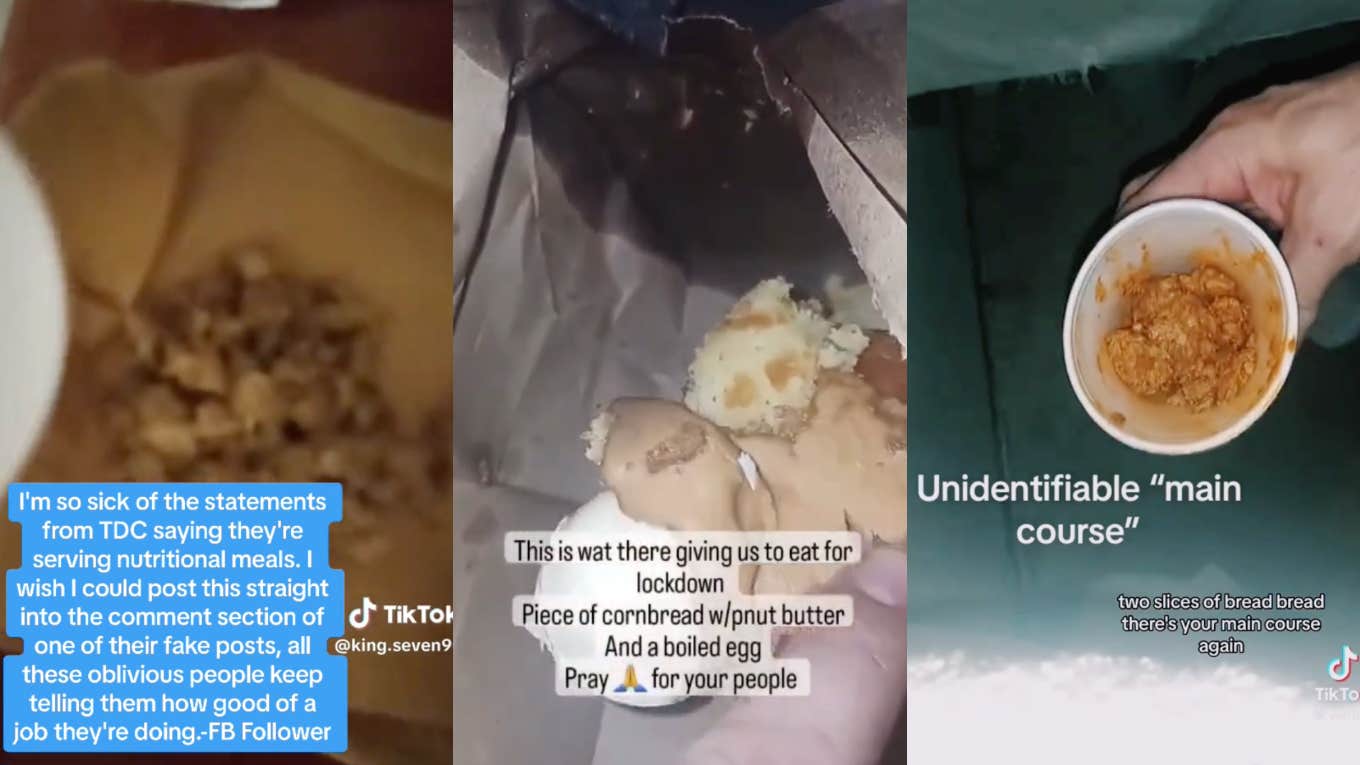Inmates In A Texas Prison Share Videos Of The Inedible Food They Are Given
These inhumane conditions go against the American penal system's mission to rehabilitate inmates.
 @tdcj_afterhrs / TikTok
@tdcj_afterhrs / TikTok For years, many prison reform activists have continued to speak openly about the American penal system's issues with rehabilitative issues, sentencing, and the bleak conditions inside many of these prisons around the country.
Unfortunately, many of these concerns have fallen on deaf ears, including recent videos that have emerged from the inmates of a Texas prison, who are attempting to expose the inhumane way they are being treated.
Several videos taken by inmates at a Texas prison reveal the questionable meals they are being served.
The Texas prison inmates have been forced to take their situation to social media by documenting the inedible foods they are being fed during a statewide prison lockdown. According to ABC13, the Texas Department of Criminal Justice initiated the lockdown on September 13 with the aim of addressing a "rise in dangerous contraband and drug-related homicides."
While the lockdown was lifted at 46 different Texas prison units, it still remains in effect at 52 other facilities, as hundreds of weapons, drugs, and an estimated 35 gallons of alcohol were found. The lockdown limited the movement of inmates and their contact with people outside prison facilities, in addition to requiring inmates and staff to "undergo intensified searches to intercept and confiscate contraband," according to the news outlet.
Unfortunately, due to the lockdown, many Texas prisoners are not allowed to leave their cells to be in the mess hall and are instead given a baggy full of food they are told to eat — except many of these foods appear unsuitable for human consumption.
In TikTok videos, inmates shared that they were given oatmeal for breakfast, but the oats were not cooked and instead thrown into the bag. For lunch, two slices of untoasted and stale bread, an "unidentifiable main course," and a "sandwich" with just a smear of peanut butter.
In another video, an inmate shared that during the lockdown, prison staff had only given him a piece of cornbread with peanut butter and a boiled egg. "Pray for your people," they wrote in overlay text on the video.
Other prisoners even admitted that they hadn't been fed since breakfast despite being told they were required to have three meals a day.
Texas officials have denied that the inmates in these prisons were being starved and fed inedible foods.
In a statement sent to Distractify, the Texas Department of Criminal Justice strongly denied that any of the inmates in their prisons were being starved or given less than three meals a day during the statewide lockdown.
"These videos do not represent the food provided to our inmate population," they told the publication. "TDCJ has staff across the state monitoring the quality and quantity of food. During the lockdown, meals are provided three times a day, with one of the meals being a hot meal."
However, another Texas inmate quickly dispelled the response, posting another TikTok video that directly called out the TDCJ for lying about the fact that they are serving "nutritional meals."
"I'm so sick of statements from TDC saying they're serving nutritional meals. I wish I could post this straight into the comments section of one of their fake posts," the inmate wrote in overlay text. "All these oblivious people keep telling them how good of a job they're doing."
The inhumane conditions in many U.S. prisons, not just the ones in Texas, have long been called into question. Back in July 2023, dozens of prisoners' relatives and former prison inmates gathered at the Texas state Capitol to protest about the dehumanizing treatment of prison inmates. Due to a sweltering heat wave in the Lone Star State, it was reported that up to 13% of deaths of prisoners were attributed to the heat.
The American penal system has neglected its mission of rehabilitating and providing resources for inmates.
The goal of the prison system is to be rehabilitative, but instead of providing inmates with the necessary resources and programs to address the underlying causes of their criminal behavior, prisons often neglect rehabilitation efforts.
The United States has high incarceration numbers: 0.7% of the population is currently in prison, which is about 1 in 150 people — which translates to almost 2.3 million people. If that's not enough, many people who have been incarcerated once and then released are usually arrested again for a different crime, and only return once again to the prison system because they weren't given the adequate resources to be able to survive outside in the first place.
Inmates have a right to receive healthcare, in all aspects of the word. Reports of abuse, violence, and mistreatment of prisoners by both staff and fellow inmates are disturbingly common and aren't the solution to solving crime rates and hoping that people will change.
That's why it's so vital for prison reform and prioritizing rehabilitation over punishment. Providing inmates with access to education, job training, mental health services, and substance abuse treatment can help address the root causes of their criminal behavior. Starving inmates, having overcrowded prisons, and neglecting the people who are meant to be helped will only make things worse for them whenever they are released.
Neglecting this mission will only perpetuate a continued cycle of incarceration that ultimately does not serve the best interests of society or the individuals within the system.
Nia Tipton is a Chicago-based entertainment, news, and lifestyle writer whose work delves into modern-day issues and experiences.

